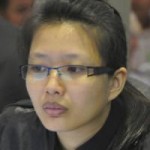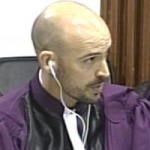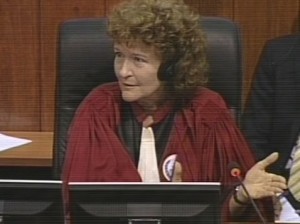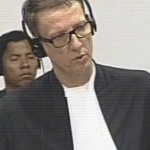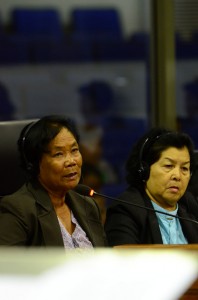“You Have To Work Until Your Blood Comes Out Of Your Body;” First Civil Party on Kampong Chhnang Airfield testifies
In the first morning session the Trial Chamber finished the cross examination of witness Mr. Yean Lon (យាន លន់), the last scheduled witness on the 1st January Dam. (You can read about his testimony here.)
Mr. Lon denied that he had executed anyone, notwithstanding his deflections the day before detailed here, or that he carried swords or knifes with dried blood on them.
When confronted again with Mr. Uth Seng’s testimony in which Mr. Seng said that Lon used to flaunt that he was in charge, Ms. Guissé asked him if he was influential and did whatever he wanted at the village.
“I was only addressing the shortages of food, said Mr. Lon “I was not influential in any other way than helping my villagers.”
—
First Civil Party on the Kampong Chhnang Airport
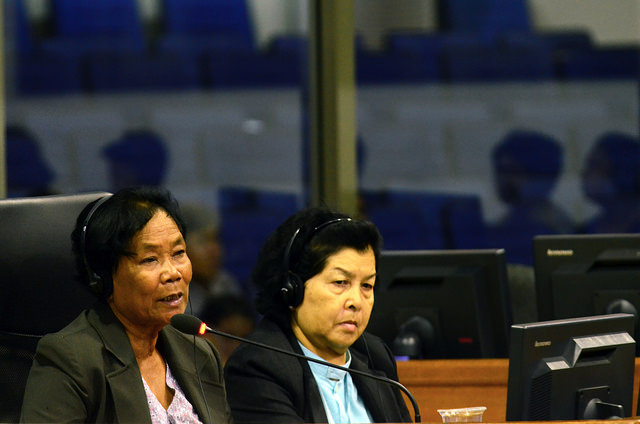
Civil Party Ms. Kong Siek (គង់ សៀក) accompanied by a TPO representative- June 17, 2015 (ECCC Flickr)
In the second session of the day, the court heard the first civil party on the Kampong Chhnang airport, Ms. Kong Siek (គង់ សៀក). Ms. Siek was born in 1952. Her husband’s name is Long Pin and she has three children
Ms. Ty Srinna, Civil Party Co-Lawyer, and Mr. Joseph Andrew Boyle, assistant prosecutor, led the examination of the Civil Party.
Civil Party, Ms. Siek, joined the military in 1975. She was single at the time and stayed single throughout the DK period. She was within division 450 stationed next to the Roeusey Keo Hospital after the fall of Phnom Penh. She said that hospital belonged to Division 450. She was a cook and gave injections to the hospital. She stayed at the hospital throughout the CPK regime but she was deployed elsewhere.
She was first deployed to O Baek-K’orm where she was attached to unit 75. She worked in the rice fields and her main task was to stop the rats. After that she was assigned to the KC airport.
She was sent to O Baek-K’orm in the first place because her superiors were arrested in 1977 by soldiers from the South West Zone, she said. She attended a meeting where she was told that since her leaders had been arrested all their followers were presumed to be affiliated with them and they had to work harder in order to avoid arrest.
“Our superior were arrested and taken to Tuol Sleng,” Ms. Siek said, “and we were told to work or we could not return and see our families.”
She saw this as a form of punishment. They subjected them to hard working conditions in the rice paddies. They did not have sufficient food and worked at night as well. They slept next to the rice paddies to prevent the rats from destroying the crops.
She thinks that the reason she was sent O Baek-K’orm was because she was associated with the soldiers from division 450 who had been arrested.
“I had to re-fashion myself,” she said “and when I was moved to the airport it was the same kind of punishment.”
Working conditions at Kampong Chhnang Airport
She was sent to the Kampong Chhnang airport construction site in 1977 with a group of females in two trucks. Only regiment 53 – the female unit– from Division 450 came to Kampong Chhnang Airport at that time, she said. Brother Suon was the division head at that time. She worked there for 6 months and then was sent back to O Baek-K’orm.
Their biographies were collected after they arrived at the airport, for the purpose of finding out if they were “good elements.“
“At that time I did not tell them that my parents were soldiers,” Ms. Siek said.
She could not chose what she wanted to do, it was “under total instruction.” There were up to a thousand workers.
Work started at 5 am, at dawn, and stopped at 9 in the evening when they were digging canals. She was then tasked with carrying earth and cement and sowing clothes.
The work was “very very tough at that time,” Ms. Siek said, “we had to complete the work. Even though we could hardly hold the hoe anymore, we dared not stop.”
All workers including herself regardless of gender were not healthy or well-fed.
“You only saw the heads, their tummies and the knee caps. Everyone was rather skinny. We had to work even if we were sick, we had to try our best,” Ms. Siek said.
The working conditions “were not like today.” The water was dirty. There was no soap. They did not have mats to sleep on or mosquito nets. They did not care about hygiene because they had no soap or food. The food was left outside with no covering for the flies. There was no body hygiene “our clothes smelled terribly at that time,” she said.
Carrying 50 Kilogram Bags of Cement
At one point, Ms. Siek was sent to carry cement in Romeas, the train station, with her entire platoon (about 30 of them). They were there for two weeks.
The working conditions were very hard, she said. The cement was very heavy and as a result she had a pain in her chest. “Women didn’t have regular period due to carrying cement,” she said.
They had to empty train wagons filled with bags of cement. It took them a fortnight to empty each wagon between all of them. Ms. Siek estimated that each woman carried between 20 to 30 bags of cement each day. Each bag weighed 50 kilograms.
“So that’s not that light” she said. “and imagine we were women, so our back was bent form the heavy weight … although we had back pain … we had to continue working… as we were afraid that if we did not do it we would be sent to be killed.”
After carrying cement she returned to dig canals.
When asked to compare the two, she said that digging canals and carrying cement were both intensive. It put a lot of strain on their physical body.
Electrocution
Ms. Siek then confirmed that she had seen people being electrocuted at the airport worksite as she had said in her OCIJ interview:
“I saw people being electrocuted while I was working at the airport worksite. We were queuing up to have a lunch and a worker signaled that people were being electrocuted underneath a mango tree and when I looked in that direction I saw two people being electrocuted… they were combatants and they were from a different unit [than my own]. That’s what I saw while queuing for my meal.”
—
After the break, Judge Fenz asked about the electrocution.
“How were they electrocuted?” she asked.
“As for the tools they used for the electrocution, Ms. Siek said “I do not know… I did not know what actually happened.”
She saw them at a distance of 10 meters away, the civil party said. There were no bushes in her way but the scene was hidden by the mango tree.
“I only saw two people under the mango tree and my friend told me that those two had been electrocuted before. One was standing up and the other was sitting down,” she said.
“I did not see them electrocuted but my friends told me that they had just been electrocuted.. Both of them were still alive,” Ms. Siek said.
Carrying 50 kg bags of cement
Ms. Siek said that at the time she was carrying 50 kilograms cement bags on her back she weighed much much less than today. She was very very thin, she said. Today, she told Judge Fenz, she weighs 60 kilograms.
“So how many hours were you carrying bags that weighed more or the same as yourself?”
“They made us carry cement from 6 a.m. until 12 p.m. and then until 5 p.m. in the evening.”
Regiment
Judge Fenz asked about the regiment meeting where she was told that her leaders had betrayed the revolution. She said that at that meeting she was told that “your previous superior had betrayed the Angka and you had to work… you have to work until your blood comes out of your body.” Then they sent her to sent O Baek-K’orm and then to Kampong Chhnang Airport.
Why did she join the army?
“My parents lived in the cooperative and they had a very difficult life. During the liberation in 1975 our younger brother came to tell us.. My parents only had their skin covering their bones.. I told myself that if I stayed in the cooperative I would not survive, so I went with my younger brother to join the army.”
—
Cross-examination
Mr. Victor Koppe, defense counsel for Nuon Chea, was then given the floor to cross-examine the civil party.
He asked about her brother named Kung Kom, who was also in Division 450. He joined in 1973 and was forced to join the Revolution by their village chief, Ms. Siek said. They separated in 1976 and Ms. Siek could not tell if her brother remained a member of Division 450 until 1979. She met him afterward after the fall of the regime in her village.
Mr. Koppe asked her whether she knew if Division 450 had 5,500 to 6,000 soldiers. Ms. Siek doesn’t know how many soldiers were in Division 450. She did confirm that Soung was the commander of 450 because she met him when she arrived and she knew his in-laws. She did not know Suong’s deputies in 450.
She confirmed that she was in Battalion 53 of Division 450. Ms. Siek did not recognize names read out by Koppe which he purported were part of Battalion 53.
She was then sent to O Baek-K’orm, unit 75, which seems to be a bodyguard unit, there were three platoons of 30 females each, Ms. Siek said.
When she arrived at O Baek-K’orm she was told that since her leaders had betrayed the revolution she was also suspect. This was the first time she heard that Soung was arrested, she said. It is like the saying of the time, Ms. Siek said: “when the big tree falls, the small trees are also crushed.”
She was at O Baek-K’orm to be screened out and monitored, she said. They slept in the abandoned houses of people who had left Phnom Penh but there were no mosquito nets. Ms. Siek was there for one rainy season in 1975 or 1976, she said.
Mr. Koppe attempts to see if she knew anything about an alleged coup organized purportedly by Suong and others. She said she did not know anything and didn’t dare to know.
“I adhered to the principle of planting the Kor Tree,” she said, “and stayed with my mouth shut.”
She said she was transferred to the Kampong Chhnang Airport in 1977 in the dry season, maybe April.
Mr. Koppe reads from a document that alleges that in March 1977 there were 1,526 soldiers and 6 guests form Division 450 at Kampong Chhnang Airfield. Ms. Siek doesn’t know how many soldiers from the Division were there. She only knows how many females were there in her own unit. She says that there were many people at the site though, maybe thousands. She doesn’t know when they got there or where they were from.
Ms. Siek says that only her unit and no one else was sent to carry the cement bags for two weeks. She said that although she had not carried cement before, other co-workers told her that they weighed 50 kilograms each.
The commander in her unit, Vun, was her commander both at O Baek-K’orm and in Kampong Chhnang airport, Mr. Koppe was able to confirm.
Mr. Koppe reads from a document about a meeting on the 11th march of 1977 of all brothers and sisters of Division 450 and 310, chaired by Ren. Ren says in this document that there was a shortage of hoes but that shortage of food had been resolved. The Civil Party Ms. Siek says she does not recall this meeting at all.
Judge Lavergne asks for the agenda of the meeting to be read:
1) To examine the ideology and politics of each unit
2) To examine the internal enemy unit among the troops and the external enemy situation
3) Tasking assigned to the party
4) Absolute respect for the party of Angka
5) Livelihood of each unit
6) Miscellaneous issues
The Civil Party Ms. Siek says again that she does not recall this meeting at all.
Torture tainted evidence
Mr. Koppe says he has a controversial question but he is asking because the prosecution brought it up first. He clarified that the document says that it was given before Suong was tortured, as the prosecution noted.
Judge Lavergne says to ask the prosecution or himself how they know that these confessions were not obtained through torture.
Mr. Koppe says he does not know.
Presumably, Judge Lavergne says, the Khmer version doesn’t have the aside that this confession was given before he was tortured. He tells Koppe to ask his Cambodian colleague to check.
Mr. Koppe says that he doesn’t have the Khmer version readily available, and that there seems to be only this summary in English made allegedly by Stephen Hedder.
“Maybe you should not use this document as we did not know the circumstances in which this document was made,” says Judge Lavergne.
Mr. Koppe says he wants to read from the document.
Judge Lavergne retorts: “Maitre Koppe you cannot read the content until we know eactly under which conditions this was obtained.”
“I wasn’t aware of a ruling on this matter, says Mr. Koppe. “I’m under the impression that we’re still waiting, ” he continues, “if you’re saying you cannot use it then there’s nothing I can do”
“Yes, you understood perfectly well,” Judge Lavergne replies.
—
The defense team for Khieu Samphan says that they don’t have any questions for this civil party and the President gives the floor to the Civil Party to make a statement to close her testimony.
In this statement Civil Parties can describe the physical and mental injuries and suffering that they suffered during the DK period, demand reparations, and ask questions to the defendants through the bench.
Civil Party Ms. Kong Siek (គង់ សៀក) accompanied by a TPO representative- June 17, 2015 (ECCC Flickr)
“Our family was evacuated to the jungle in 1973 and 1974 and they said it was for the liberty of the people. And they wanted the liberty for the people but unfortunately they evacuated us and we were subjected to very hard labor and we had to transplant rice. Where was the liberty? Where was the freedom? Where was the well being?
We were subjected to enslavement, that’s why I would like to ask this court to seek justice for me. It was very painful for us: my family did not have access to sufficient food. Actually during this regime they enslaved the people during this time. My father did not have underwear. He asked for pants. They said that whatever happened to him happened; they did not care if he was naked.
When I came to the front in 1975 as I told the court, I was subjected to hard labor.. they did not give us sufficient food…Where was the freedom? Where was the liberty that they told us about?.. That’s why I count on this court to get justice for me.
…I’m still suffering from that overwork.. I’m on regular medication and that’s the reason I survived to this day.
Where was the liberty that they promised us? Where was the freedom? So I ask this Court to get justice for me.”
–
The Court then starting hearing witness Saem Hun. His alias was Saem Kim during the Pol Pot Regime. He was born in Baksna vilalge, in Baray District in Kampong Thom Province.
He seemed to have been born in 1953 or 1954. it is not clear which one is the year of the horse. The prosecution affirmed it was 1954.
He said that monks were disrobed by the Pol Pot Regime starting in 1971 when they “were forced to ride bicycles and engage in labor.”
In 1972 he was a soldier in Division 310 in regiment 12 and battalion 123, and company 5. He entered Phnom Penh on April 17, 1975 and he was stationed next to the central market and Wat Phnom.
The Court will resume next Monday with the testimony of this witness.

